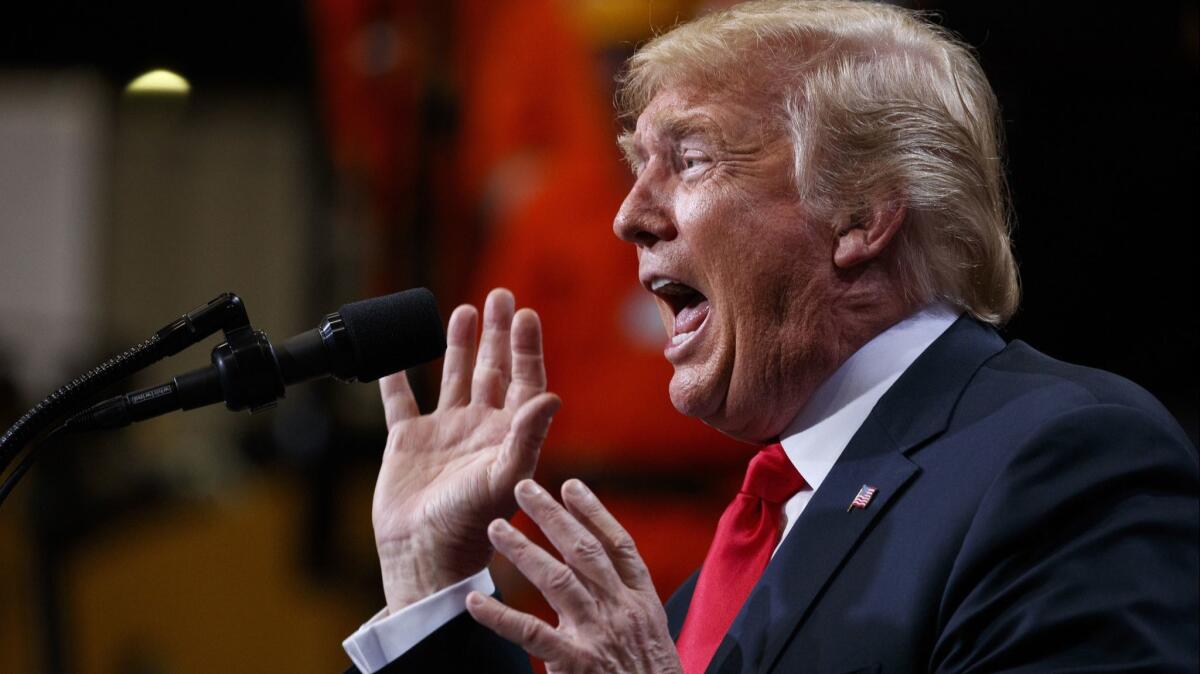Editorial: Federal judges step up to do the job Congress won’t — check the president’s excesses

- Share via
The Trump administration has gone through a few bad days recently in federal courts — and the country is the better for it.
This week, judges have rejected motions to throw out two lawsuits challenging President Trump’s policies or his apparent conflicts of interests. One lawsuit targets the administration’s malignantly conceived decision to add a question about citizenship status to the 2020 census. The other argues that Trump is violating the constitutional ban on receiving emoluments by keeping his ownership stake in the Trump International Hotel a few blocks from the White House, where foreign dignitaries book rooms and host events at least in part because of its connection to the president.
It’s reassuring to see that some federal judges, at least, are willing to live up to their responsibilities and actually check some of the president’s actions.
From the beginning of his term, Trump has taken a damn-the-torpedoes approach to policy initiatives and other executive actions, rarely taking the time to contemplate the unintended consequences, follow the statutory requirements for reversing valid regulations, or even consider whether what he wants to do is legal. Meanwhile, Republicans in Congress have abandoned their responsibility to serve as a check on the presidency, choosing in nearly every instance to look the other way while Trump and his team flouted procedural requirements and statutes to advance their agenda — whether it be wreaking havoc on the Affordable Care Act, scrapping protections for “Dreamers,” imposing costly tariffs for spurious national-security reasons, or tearing up the Iran nuclear deal.
The courts’ scrutiny could provide overdue checks on the actions of a reckless and self-serving president.
In the census case, U.S. District Judge Jesse Furman ruled in Manhattan that a lawsuit by more than two dozen states, cities, organizations and individuals can move forward. The lawsuit argues that adding the citizenship question to the decennial census would dampen participation in immigration communities, leading to an undercount. Furman ruled that even though Commerce Secretary Wilbur Ross has “broad authority” over how to conduct the census, “plaintiffs plausibly allege that Secretary Ross’ decision to reinstate the citizenship question was motivated at least in part by discriminatory animus and will result in a discriminatory effect.”
In fact, internal government emails released as part of the lawsuit revealed that former White House advisor Steve Bannon raised the citizenship issue with Ross, who then leaned on Justice Department officials to request that the question be added under the ruse that they needed the details to better enforce the 1965 Voting Rights Act. Pure pretext.
Enter the Fray: First takes on the news of the minute from L.A. Times Opinion »
In the emoluments case, U.S. District Judge Peter J. Messitte in Maryland not only allowed the case to move forward (which might also lead to public disclosure of some of Trump’s tax returns), but defined for the first time what constitutes an emolument. The obscure constitutional prohibition on emoluments was largely forgotten until Trump’s wealth and extensive holdings spotlighted it (wealthy modern presidents typically sold their assets and placed the money in a blind trust). Messitte embraced a broad definition and said pointedly that there need not be evidence of a quid pro quo for a violation to have occurred. The framers of the Constitution, he wrote, sought to preclude foreign and domestic governments from influencing a president by applying the prohibition to “any profit, gain, or advantage, including profits from private transactions.”
“Where, for example, a president maintains a premier hotel property that generates millions of dollars a year in profits, how likely is it that he will not be swayed, whether consciously or subconsciously, in any or all of his dealings with foreign or domestic governments that might choose to spend large sums of money at that hotel property?” the judge wrote.
At heart, these rulings are incremental steps, and neither decision means that the plaintiffs will prevail — though we hope they do. The citizenship question is a cynical attempt by the administration to undermine the accuracy of the count and potentially cheat (mostly Democratic) states with high numbers of immigrants out of congressional representation. And the conflicts between Trump’s business interests and the public’s interest have left the American people rightfully suspicious of whose interests the president serves first. But most fundamentally, the courts’ scrutiny could provide overdue checks on the actions of a reckless and self-serving president, which is how the system is supposed to work.
Follow the Opinion section on Twitter @latimesopinion or Facebook
More to Read
A cure for the common opinion
Get thought-provoking perspectives with our weekly newsletter.
You may occasionally receive promotional content from the Los Angeles Times.









